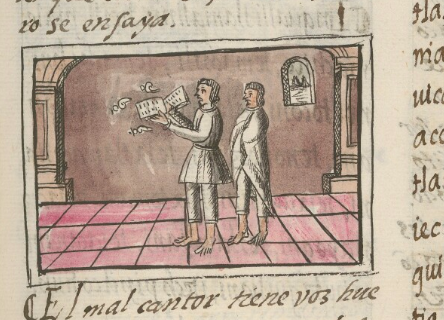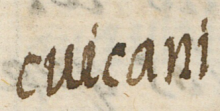cuicani (FCbk10f19r)
This iconographic example, featuring a singer (cuicani) holding a book of music, is included in this digital collection for the purpose of making comparisons with related hieroglyphs. The term selected for this example comes from the text on the same page in the Digital Florentine Codex. There is no gloss, per se. This example shows a man in profile, facing left. He wears a long-sleeve shirt with a plain trim on the neck and at the wrists. He holds an open songbook with short straight lines on the two visible pages. This may represent musical notation, but it is difficult to tell. His mouth is open, as though singing. The three speech scrolls that come from his mouth are not just simple volutes, but also have added small circles, dots, and short lines. This may be the tlacuilo’s effort to distinguish these as not simple words but lyrics of his song, although a healer speaks the same type of volute on folio 20 recto. The contextualizing image suggests he may be in a Christian church. Another man stands by him. While they both wear European-style trousers and shirts, the man who is watching and listening has an added cloak (tilmatli), which makes it clear he is a Nahua man. They both probably are. Many colonial churches inducted Nahua singers from their parishioners.
Stephanie Wood
Other musical volutes with interesting details–and some painted turquoise blue–appear below. Jeanette Peterson (Florentine Codex 2019, 27) discusses the coloring of some other song scrolls that appear in Book 8. One glyph for cuicanime (singers) shows simply a songbook with short black lines suggesting lyrics and/or musical notation, much like the one in this record. Glyphs and the iconography of books could have many associations, but often they were found in churches and could even be equated with church singers, as a couple of examples below underline.
Stephanie Wood
cuicani
Stephanie Wood
1577
Jeff Haskett-Wood
cantores, música, canción, canciones, volutas
cuicani, a singer, https://nahuatl.wired-humanities.org/content/cuicani
el cantor
Stephanie Wood
Available at Digital Florentine Codex/Códice Florentino Digital, edited by Kim N. Richter and Alicia Maria Houtrouw, "Book 10: The People", fol. 19r, Getty Research Institute, 2023. https://florentinecodex.getty.edu/en/book/10/folio/19r/images/0 Accessed 5 September 2025.
Images of the digitized Florentine Codex are made available under the following Creative Commons license: CC BY-NC-ND (Attribution-NonCommercial-NoDerivs 4.0 International). For print-publication quality photos, please contact the Biblioteca Medicea Laurenziana ([email protected]). The Library of Congress has also published this manuscript, using the images of the World Digital Library copy. “The Library of Congress is unaware of any copyright or other restrictions in the World Digital Library Collection. Absent any such restrictions, these materials are free to use and reuse.”






